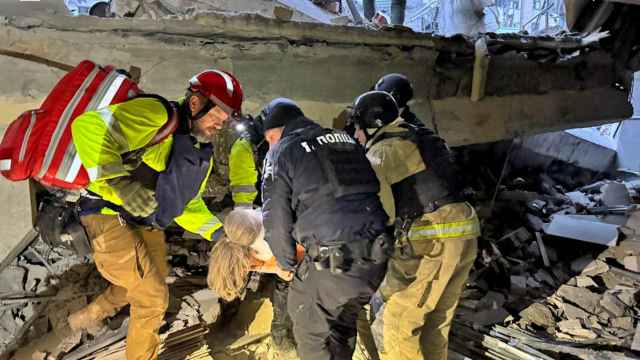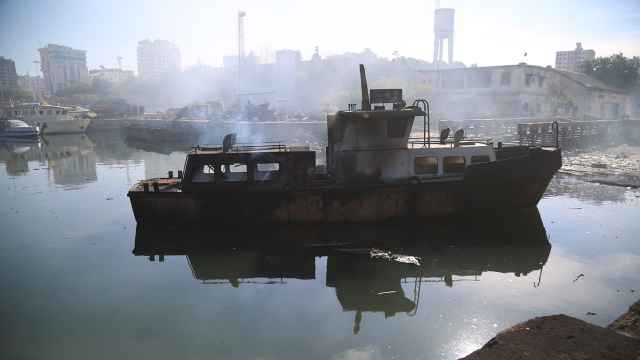A small army of international monitors has gone to the gritty lands of eastern Ukraine to persuade separatist militias to lay down their weapons — but for now at least the most they may be able to hope for is to stop a bad situation getting worse.
Armed only with copies of a diplomatic communique drafted in a Geneva hotel, about 100 monitors have been posted in 10 trouble-spots in Ukraine with the task of de-escalating the crisis that pits pro-Russian separatists against Kiev's leaders.
On the ground, that means trying to persuade armed groups who have seized police and state security installations in towns near the border with Russia to end their occupation. The monitors do not carry weapons.
But with isolated shootings, abductions and killings in the east now unnerving the Kiev central government and pushing it towards a security crackdown, time might not be on the side of the monitors to pull off a breakthrough that could boost confidence in the April 17 Geneva agreement.
Without a quick success in the badlands of eastern Ukraine, the U.S. and Europe could go ahead with further sanctions against Russia — a move likely to complicate the monitoring task further.
The special mission, run by the Vienna-based Organization for Security and Cooperation in Europe, or OSCE, is just a few days old. Only modest gains have been recorded with some unspecified buildings "unilaterally" vacated, according to OSCE officials.
Nothing more should be expected at this stage, most OSCE officials say, given the level of distrust between many parts of the east — economically depressed and especially vulnerable to the Russian script on events in Ukraine — and the Kiev government.
Patience, impartiality and painstaking work aimed at building trust is what the game is all about, they say.
Though they face tough odds, the organization has a track record of quietly and without fanfare untangling conflicts in troubled corners of the former communist bloc.
Its teams are often ex-military people, have usually been in other ex-Soviet hotspots, and they include mediators seconded from Russia — a crucial factor if they are to win the confidence of armed pro-Russian groups in eastern Ukraine.
The OSCE can already draw cheer that there have been no new occupations of buildings by separatists since OSCE monitors who include civil servants, police, military and peacekeepers from the 57-nation group were deployed in the field.
"Their [OSCE monitors'] very presence is often sufficient to deter people from doing things that are stupid, and I think this is probably working in Ukraine," said one senior OSCE official with knowledge of how monitors work in conflict situations.
"It does slow things down a bit. It requires people to take a breath and think about what they are doing."
Geneva Accord
Talks in Geneva involving the U.S., Russia, the European Union and Ukraine gave the OSCE a mandate to hustle together the monitoring force and get it out to Ukraine fast.
The number of monitors will gradually rise to 300 and reach possibly as many as 500 in the coming weeks, OSCE officials say.
Typically, teams of mainly Russian-speaking monitors go into the field ready to sit down with pro-Russian separatists and explain the international push for them to end their rebellion.
That means handing out to the rebels copies of the Geneva agreement which calls for an end to the separatists' occupation of buildings and public places and explaining what is expected.
It also, crucially OSCE officials say, offers freedom from prosecution for anybody who puts down his weapon and leaves occupied premises.
"There are a lot of people there [in eastern Ukraine] who simply do not know what is in the accord. Monitors will give them copies and be on hand to explain to them what it means," another OSCE official said.
The OSCE'S main man on the ground, British soldier-diplomat Mark Etherington, has met separatist representatives in the two "hard" areas of Donetsk — the centre of the self-proclaimed Donetsk People's Republic — and Slavyansk, a fiercely militant separatist redoubt 110 kilometers to the north.
Etherington, a former British army paratrooper with conflict-management experience in former Yugoslavia and Iraq, emerged from 1 1/2 hours of talks with separatist representatives in Donetsk on Tuesday to say he had had "a useful and constructive meeting."
A day earlier, he had talks with Vyacheslav Ponomaryov, self-proclaimed leader of separatists who control Slavyansk.
The two separatists, after meeting Etherington in Donetsk, spoke of clearing some parts of the regional administration building they have been occupying — though not vacating it.
There was no suggestion though of any compromise in their comments. "We explained our position. It is no different than that we have voiced at various press conferences … Things will never be as they were," one of them said.
Sitting With The Rebels
The ultimate measure of success for a 10-person team in the border city of Luhansk, headed by Andrea Cellino, an Italian international civil servant, will be to persuade armed men to vacate the offices of the state security agency SBU.
More than two weeks ago, a group of pro-Russian separatists who call themselves the People's Army of the East seized the building. They took arms from the armory there, hoisted the Russian flag and have occupied it since.
Like their comrades-in-arms in Donetsk and Slavyansk they are pressing for a referendum to be held on May 11 to decide the region's future.
"Our mandate is mainly to observe and report, to establish contact with all the actors not just the occupiers, but civil society, local police, local journalists. Our mandate is to encourage dialogue among the different sides," Cellino said in a phone interview with Reuters.
Cellino said his team, which includes one Russian ex-policeman, had already met separatist representatives "on neutral ground, in a nearby hotel." He declined to give specifics of the meeting but said the team had explained the Geneva accord.
"There is an awareness [by the separatist]. The text is known and we are certain the content is being acknowledged and being seen by everyone," he said.
This is not the first such operation in Europe, or in post-Soviet territory for the OSCE.
When Russia invaded Georgia in 2008, OSCE monitors played a significant part in the withdrawal of Russian forces from the city of Gori after Russian military had pushed south out of the Russian-backed breakaway region of South Ossetia.
The OSCE group on the ground monitored the pull-back of Russian troops which had threatened to cut the country in half and made sure that agreements were implemented.
In 2001, when conflict erupted in Macedonia between the government and ethnic Albanian insurgents, OSCE mediators helped draft an agreement and provided a negotiator to help free people taking hostages — a significant part of the denouement of the crisis, the OSCE official said.
But the volatility of the situation in eastern Ukraine is a constant threat to the measured tread of the OSCE and could derail its mission.
On Tuesday, U.S. Vice President Joe Biden visited Kiev delivering an aid package to the embattled leadership and demanding that Russia do more to put pressure on the separatists to disarm.
Even before Biden's plane had even reached its refueling stop in Ireland on its way back to the United States, the security picture had changed in Ukraine.
Acting president Oleksandr Turchynov announced he was relaunching a suspended "anti-terrorist" operation because of the murder of a local official from his party.
In Slavyansk, separatists, who are already holding at least one Ukrainian journalist, detained a U.S. reporter and were still holding him on Wednesday.
Asked about prospects of success for his mission, Cellino said: "I do not know. It depends on many factors. It depends on local factors, but also on national and international factors."
A Message from The Moscow Times:
Dear readers,
We are facing unprecedented challenges. Russia's Prosecutor General's Office has designated The Moscow Times as an "undesirable" organization, criminalizing our work and putting our staff at risk of prosecution. This follows our earlier unjust labeling as a "foreign agent."
These actions are direct attempts to silence independent journalism in Russia. The authorities claim our work "discredits the decisions of the Russian leadership." We see things differently: we strive to provide accurate, unbiased reporting on Russia.
We, the journalists of The Moscow Times, refuse to be silenced. But to continue our work, we need your help.
Your support, no matter how small, makes a world of difference. If you can, please support us monthly starting from just $2. It's quick to set up, and every contribution makes a significant impact.
By supporting The Moscow Times, you're defending open, independent journalism in the face of repression. Thank you for standing with us.
Remind me later.





